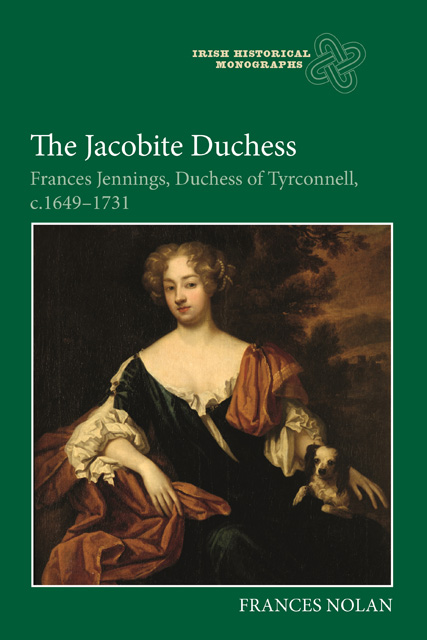Book contents
- Frontmatter
- Dedication
- Contents
- List of illustrations
- Acknowledgements
- List of abbreviations
- Notes on the text
- Introduction
- 1 ‘The malicious little gipsy’: Early life, c.1649–65
- 2 ‘Hambleton is now going into France’: Marriage, motherhood and migration, 1666–76
- 3 ‘Ruined beyond redemption’?: Widowhood, remarriage and returning, 1676–86
- 4 ‘That caballing humour’: A political woman, 1687–90
- 5 ‘Every one’s eye is watching’: Treason, forfeiture and exile, 1691–99
- 6 ‘Always a plane dealor’: Changing fortunes and life in the Low Countries, 1700–08
- 7 ‘A duchess-nun’?: Family, faith and finance in old age, 1708–30
- 8 ‘Albion’s fairest plant’: Death and legacy, 1731
- Appendix A: Duchess of Tyrconnell’s family tree
- Appendix B: Books in the possession of the duchess of Tyrconnell in Dublin, transported from her apartment in the Château de Saint-Germain-en-Laye
- Appendix C: David Nairne’s ‘Cyffer w[i]th the D[uche]sse of Tyrconnel, 5th August 1702’
- Bibliography
- Index
- Irish Historical Monographs previous volumes
5 - ‘Every one’s eye is watching’: Treason, forfeiture and exile, 1691–99
Published online by Cambridge University Press: 04 January 2024
- Frontmatter
- Dedication
- Contents
- List of illustrations
- Acknowledgements
- List of abbreviations
- Notes on the text
- Introduction
- 1 ‘The malicious little gipsy’: Early life, c.1649–65
- 2 ‘Hambleton is now going into France’: Marriage, motherhood and migration, 1666–76
- 3 ‘Ruined beyond redemption’?: Widowhood, remarriage and returning, 1676–86
- 4 ‘That caballing humour’: A political woman, 1687–90
- 5 ‘Every one’s eye is watching’: Treason, forfeiture and exile, 1691–99
- 6 ‘Always a plane dealor’: Changing fortunes and life in the Low Countries, 1700–08
- 7 ‘A duchess-nun’?: Family, faith and finance in old age, 1708–30
- 8 ‘Albion’s fairest plant’: Death and legacy, 1731
- Appendix A: Duchess of Tyrconnell’s family tree
- Appendix B: Books in the possession of the duchess of Tyrconnell in Dublin, transported from her apartment in the Château de Saint-Germain-en-Laye
- Appendix C: David Nairne’s ‘Cyffer w[i]th the D[uche]sse of Tyrconnel, 5th August 1702’
- Bibliography
- Index
- Irish Historical Monographs previous volumes
Summary
News travelled slowly and unreliably in the seventeenth century, but rumours of Tyrconnell’s death had reached London by early September, when Lady Rosse wrote to her aunt Sarah Churchill, by then countess of Marlborough, and revealed that ‘I was ‘til now in ye greatest grief imaginable at ye news … but I begin to hope it is not soe, though still in some feare’. Any hope was, of course, ill-founded. By mid-month, word of the lord lieutenant’s death circulated at the French court and presumably reached the duchess of Tyrconnell at Saint-Germain-en-Laye. There is no record of Frances’s reaction to the news of her husband’s death, but there is enough evidence of their relationship to infer that she grieved sincerely. Richard Talbot’s devotion to her at the Restoration court was apparently genuine and his pursuit of her in Paris many years later, when both were widowed, resulted in a mutually beneficial marriage. When it happened, the couple’s return to England and then Ireland in 1683/84 marked the beginning of a remarkable ascent to power, one that was founded on mutual respect, trust and a belief in the other’s ability. This was evident in the letter that Frances wrote to Richard in May 1689, but it was borne out more fully by the role she played in his political manoeuvrings. The Sheridan affair demonstrated that his enemies were her enemies and that she was very capable of working to undermine those who opposed her and her husband; the earl of Melfort’s correspondence with James in 1690 sought to disparage the Tyrconnells, but also revealed that they remained united in the face of opposition, even when Frances was accused of fomenting discord. Richard also trusted Frances to advertise Jacobite disarray to the French, in order to secure additional support from Louis XIV; a task of the highest importance.
In mourning, the duchess of Tyrconnell provided 300 livers to the Blue Nuns in Paris, to pay for a mass for her husband’s soul and to defray the expense of any bread and wine used in his annual masses. In August 1692, she arranged a funeral service for him in the convent church, with an oration provided by the Abbé Antoine Anselme.
- Type
- Chapter
- Information
- The Jacobite DuchessFrances Jennings, Duchess of Tyrconnell, c.1649-1731, pp. 114 - 141Publisher: Boydell & BrewerPrint publication year: 2021

